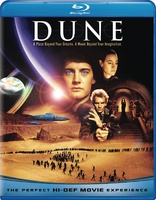Dune Blu-ray Movie
HomeDune Blu-ray Movie 
Universal Studios | 1984 | 137 min | Rated PG-13 | Apr 27, 2010Movie rating
6.7 | / 10 |
Blu-ray rating
| Users | 3.9 | |
| Reviewer | 3.5 | |
| Overall | 3.9 |
Overview
Dune (1984)
A Duke's son leads desert warriors against the galactic emperor and his father's evil nemesis when they assassinate his father and free their desert world from the emperor's rule.
Starring: Kyle MacLachlan, Sting, Kenneth McMillan, Francesca Annis, Sean YoungNarrator: William Phipps
Director: David Lynch
| Sci-Fi | Uncertain |
| Epic | Uncertain |
| Action | Uncertain |
| Fantasy | Uncertain |
| Adventure | Uncertain |
Specifications
Video
Video codec: VC-1
Video resolution: 1080p
Aspect ratio: 2.35:1
Original aspect ratio: 2.39:1
Audio
English: DTS-HD Master Audio 5.1 (48kHz, 24-bit)
French: DTS 2.0
Subtitles
English SDH, French, Spanish
Discs
50GB Blu-ray Disc
Single disc (1 BD)
BD-Live
D-Box
Playback
Region free
Review
Rating summary
| Movie | 3.5 | |
| Video | 4.0 | |
| Audio | 5.0 | |
| Extras | 2.5 | |
| Overall | 3.5 |
Dune Blu-ray Movie Review
"It's been so serious around here lately," Kyle McLachlan as Paul Atreides complains in David Lynch's 'Dune.' Boy, is that ever an understatement with this often ponderous adaptation.
Reviewed by Jeffrey Kauffman April 17, 2010High school intellectuals like thick books. Carrying around a several pound tome, especially if itís a dog-eared paperback, lends a certain brainy ambience to even the geekiest student. In my day, there were two camps of book carriers: the rational, Apollonian types who invariably foisted Ayn Randís Atlas Shrugged toward any unsuspecting soul who ventured their way, and the more emotionally constructed, perhaps Dionysian, types, who tended to hoist Frank Herbertís Dune from class to class. One might assume that all the Rand readers were Young Republicans, indoctrinating themselves in a Greenspanian universe of self interest and, frankly, a good dose of narcissism, while the followers of Herbert might be expected to grow up to join groups like Move On and watch MSNBC. In my case at least, that couldnít be further from the ultra-liberal truth, though I even upped the ante by marrying my Rand volume with The Viking Portable Nietzsche. (No, I didnít have much of a social life, as you might have guessed). And so, being at least a putative Randian in those days, my introduction to the labyrinthine world of Herbertís Dune came mostly via discussions with ardent fans of the series, who gave me at least a general sense of the outline of the initial book and its sequels. Obviously a quasi-mystical treatise with thinly veiled allegories relating to any number of Earthly religious traditions, Dune was a large, lumbering book that, at least in my experience, tended to divide even its most ardent supporters. Some simply insisted the book was a sort of Second Coming in and of itself, a messianic work of sheer genius. Others who undeniably loved the book were a bit more open in discussing what they perceived as some of its flaws, including an overly complex plot and a somewhat less than completely captivating writing style, at least at times.
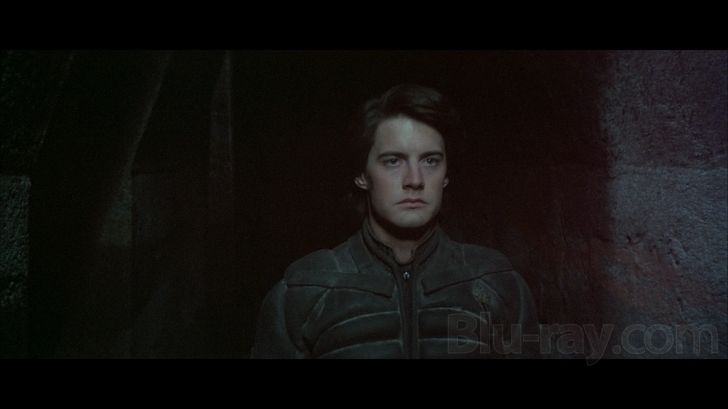
Kyle McLachlan as Paul Atreides.
And so itís little wonder that adapting the novel to film caused a whole string of producers and directors well over a decade of fits before it finally landed in the lap of perhaps the most unlikely name ever associated with the property as it slowly roasted in the fires of development hell: David Lynch. Lynch had become a cause celŤbre after having directed Eraserhead and then at least partially erupting into the mainstream with his film version of The Elephant Man. His quasi-hallucinogenic approach seemed at first glance anyway to meld well with Herbertís impressionistic universe where the ďspiceĒ (think drug) mťlange expands consciousness and is the most sought after element on the desert planet of Arrakis. But as anyone who has attempted to glean some sense from Eraserhead or Twin Peaks will tell you, Lynch is not always the model of clarity when it comes to plot and character, and might even be accused of certain excesses more than a little bit, so some wiser heads even in those days before the film attained its rather notorious reputation may have wondered if this particular director actually was the best choice to bring such a sprawling source novel to the screen.
The fact is, despite Lynchís aversion to the finished project, Dune the film is not as horrible as any number of respected reviewers have insisted (nor is it the classic that such iconic figures as Harlan Ellison have argued through the years). Like the novel itself, the film is problematic and was perhaps too large for its format (the 2000 miniseries at least had the time and space, no pun intended, to attempt to delve in the bookís many characters and subplots, which the feature film simply didnít). That said, itís an often riveting recreation of one of the more unique fictional universes ever put on film. It retains a positively Lynchian vision, despite the directorís insistence that the final version barely resembles what he intended, and it is full of some very appealing performances, from then new star Kyle McLachlan to a whole host of stellar supporting players, including Virginia Madsen, Brad Dourif, Max Von Sydow, Linda Hunt, Sting, Patrick Stewart and Sian Phillips.
Itís rather interesting to compare Duneís fate with a little film that came a few years earlier. Perhaps youíve heard of it, I believe it was called Star Wars or something like that. If Lucasí film exulted in its own comic book, Good versus Evil ethos, recreating a sort of Saturday serial Buck Rogers universe, it still posited a cut and dried, white hats against black hats situation that is more or less at the core of Dune as well. The problem with Dune, both the film as well as perhaps the book itself, is it is so relentlessly serious, even operatic, in its ambitions that the pure fun of entering an alternate universe all but disappears in a cloud of dust and sand.
Dune concerns the messianic figure of one Paul Atreides (McLachlan in his first major role), heir apparent to the ďgood guyĒ royal family headed by Paulís father, Duke Leo Atreides (JŁrgen Prochnow). The Atreides clan is up against an Evil Emperor (sound familiar?) named Shaddam Corrino (Josť Ferrer, in his best scenery chewing mode), who plots to not only corner the spice market but attain complete power over the universe (do Evil Emperors do anything else?). He hatches an elaborate plot to give control of Arrakis, the only source of spice in the galaxy, to the Atreides, but secretly sets up a showdown with the Atreidesí arch-enemies, the Harkonnens. That, in a nutshell, is what Dune is all about, but thatís somewhat akin to saying War and Peace is about Russia, or, indeed, that Atlas Shrugged is about some missing guy named John Galt. Herbertís novel is a laboriously constructed piece that literally creates a whole new universe populated by a variety of interesting characters. Part of the fault that can undeniably be found with the film is its attempt to oversimplify things and retain focus on Paul and his attempts to mount a Jedi like revolt against the powers that be. Unfortunately, that very oversimplification ironically works against the film, leaving large swaths of it virtually incoherent to anyone not at least passingly familiar with Herbertís work.
Part of the problem with Lynchís screenplay is probably due to a reaction to the fear of the film being incomprehensible to neophytes, leading to an overcompensation with its perhaps understandable emphasis on exposition, which begins literally right off the bat with Virginia Madsenís introduction delivered fully frontal, so to speak, right to the audience. But the film is filled with Strange Interlude moments where we hear various charactersí inner thoughts, as if to give us some filmic intimation of an omniscient narratorís overview in a novel. It unfortunately does not translate well to the screen, and even ostensibly straight dialogue segments seem to be constructed in order to give us at least a clue about the crazy and convoluted world of Herbertís original creation.
What weíre left with then is an often visually arresting production with some standout performances built around a histrionic plot that may leave more than a few people dissolved in a puddle of helpless giggles. Lynch mounts it all with a fair degree of directorial flair, bringing the arid wasteland of Arrakis virtually palpably to the screen. As didactic as his screenplay often is, directorially heís more at home with ambiguity and a less prosaic approach, letting misty and dusty shots lend an aura of uncertainty to the proceedings. McLachlan is largely quite effective in his first film role, essaying the slow metamorphosis of Paul from a starry-eyed youth to a gritty and determined freedom fighter. The supporting cast is full of some wonderful turns as well, including Sting as a kind of futuristic malevolent punk.
There was probably no way a novel as gargantuan as Dune could have been condensed effectively into a roughly two hour and thirty minute film experience. In fact, even the much longer miniseries which came a decade and a half later probably wasnít completely satisfactory to longtime fans of Herbertís creation, though it at least had the luxury of time to develop plot and characters. If Dune is sometimes messy, and often too portentous for its own good, itís also sort of the anti-Star Wars, that is, a film which revels in its own serious intent and purposes and rightly or wrongly makes no apologies for that Łber-dramatic tone.
Dune Blu-ray Movie, Video Quality 
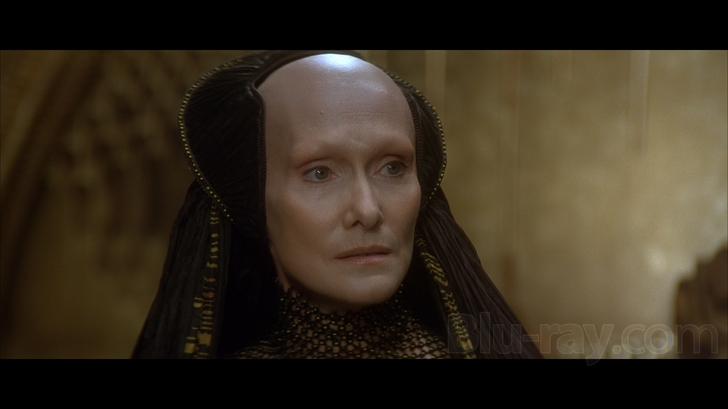
Dune treks to Blu-ray with an appealing VC-1 encoded transfer in full 1080p and a 2.35:1 aspect ratio. The good news is, this is certainly the best this film has ever looked, with a sharpness and clarity that puts the previous DVD releases (in any of the many versions of the film) to shame. For a film 25 years old now (it hardly seems possible), this is a remarkably good looking transfer, with abundant detail and thankfully no artifacting on usual suspects like Sian Phillips' heavily brocaded costumes or the arabesques of the Emperor's palace. The bad news is while the color is very robust and well saturated and provides some really eye popping moments, some of the flesh tones seem more than a bit on the ruddy red side for my personal taste, and the higher resolution of the Blu-ray really brings out some of the now "ancient" technology of the special effects, including matte paintings that look patently fake, and green screen work that clearly shows its age. On the whole, though, Dune's many special effects come through quite splendidly on this release, especially the many models and miniatures utilized. Black levels are impressively inky throughout, lending the space segments appropriate depth, and contrast is excellent as well.
Dune Blu-ray Movie, Audio Quality 
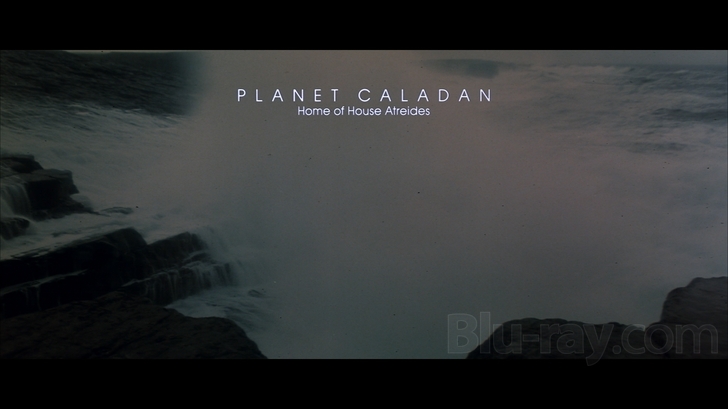
Get ready for a rumbling good time with Dune's very impressive DTS-HD MA 5.1 track, which kicks into LFE heaven from the first moments and rarely lets up for more than two hours. This is one of the most bass heavy tracks in recent memory, full of thundering low frequencies that will leave your floorboards vibrating in ecstasy. Directionality and surround activity are also top notch throughout this effort. The opening palace scene with Ferrer and Madsen is a great example, with a beautiful hall ambience filling the surround channels and various groups of people clearly and perfectly directional as they move about the scene. All of the wonderful foley effects fill the soundfield with a wide array of aural pleasures, not the least of which are the omnipresent wind effects on Arrakis, which whip and pan from channel to channel like an out of control cyclone. Dialogue is always clear and precise, though, while directional, is uniformly anchored to the front channels, at least insofar as the main characters are concerned. I'm less fond of Toto's synth-laden score, but it's reproduced here with excellent fidelity. The entire track has incredible dynamic range, even with its omnipresent emphasis on lower frequencies. If only the rest of the movie were this fun.
Dune Blu-ray Movie, Special Features and Extras 
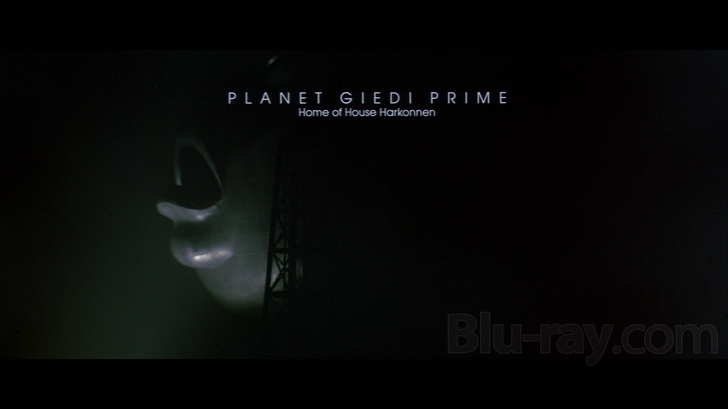
All of the SD extras of the Extended Edition SD-DVD have been ported over to this Blu-ray release:
Deleted Scenes (17:18) features several jettisoned segments, and includes an interesting introduction by producer Raffaella De Laurentiis, who dispels the notion that there was a mythical four hour version of Dune that never made it to the screen.
Designing Dune (8:54) talks about the multi-culturalism of the production design team.
Dune FX (6:00) details some of the 800 effects shot, some rather groundbreaking in their day, which augment the film.
Dune Models and Miniatures (7:01). Remember the days before CGI? If you don't, watch this featurette for a little insight into what it used to take to make a sci-fi film.
Dune Costumes (4:49) interviews designer Bob Ringwood and his staff about the 9,000 costumes needed for the film.
Bookmarking via My Scenes, BD Live and D Box are also available.
Dune Blu-ray Movie, Overall Score and Recommendation 
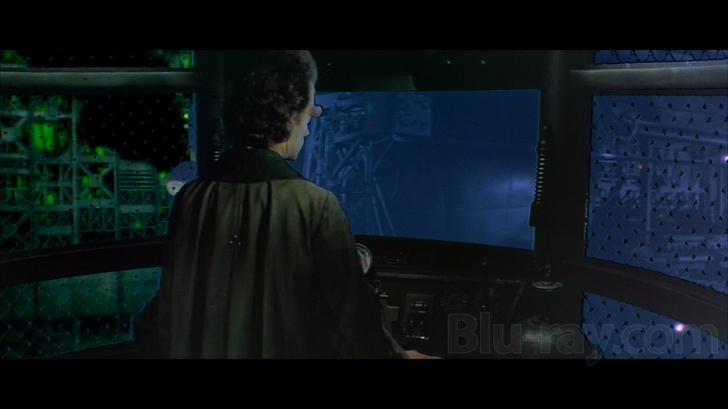
Dune is a film that can be as dry as a long walk through the Sahara. But there's also quite a bit of visual bombast here which patient viewers can see as their personal oases. McLachlan and the rest of the cast do as well as can be expected with an often pretentious screenplay, but Lynch's very unique visual style, as nascent as it was back in the mid-80's, is still fully on display here, lending the film a certain sweep and romance. It's serious, yes, but that's not necessarily a bad thing.
Other editions
Dune: Other Editions

Dune
with Warcraft Fandango Cash
1984

Dune 4K
Limited Edition
1984

Dune
Limited Edition
1984

Dune 4K
Limited Edition
1984

Dune 4K
Limited Deluxe Edition
1984

Dune 4K
Standard Edition
1984

Dune
Special Edition
1984

Dune 4K
Special Edition
1984

Dune
Australian Import
1984

Dune 4K
Limited Edition | + Sleeper Must Awaken docu & Extended Version BDs / Import
1984
Similar titles
Similar titles you might also like

Star Wars: Episode IV - A New Hope 4K
1977

Star Wars: Episode I - The Phantom Menace 4K
1999

Star Wars: Episode III - Revenge of the Sith 4K
2005

Star Trek: The Complete Original Series
1966-1969

Stargate
Extended Cut
1994

Valerian and the City of a Thousand Planets
2017

Doctor Who: Complete Series 1-4
2005-2008

Star Trek 4K
2009

Star Trek Beyond
Bonus Disc / Exclusive Packaging / Character Cards
2016

Ender's Game
2013

Jupiter Ascending
2015

Star Wars: Episode VI - Return of the Jedi 4K
1983

Star Wars: Episode II - Attack of the Clones 4K
2002

Star Wars: Episode VIII - The Last Jedi 4K
Ultimate Collector's Edition
2017

Star Wars: Episode VII - The Force Awakens 4K
2015

Star Trek: Picard - The Complete Series
2020-2023

Star Wars: Episode IX - The Rise of Skywalker 4K
Ultimate Collector's Edition
2019

Star Trek II: The Wrath of Khan 4K
1982

Star Trek III: The Search for Spock 4K
1984

Star Trek IV: The Voyage Home 4K
1986
